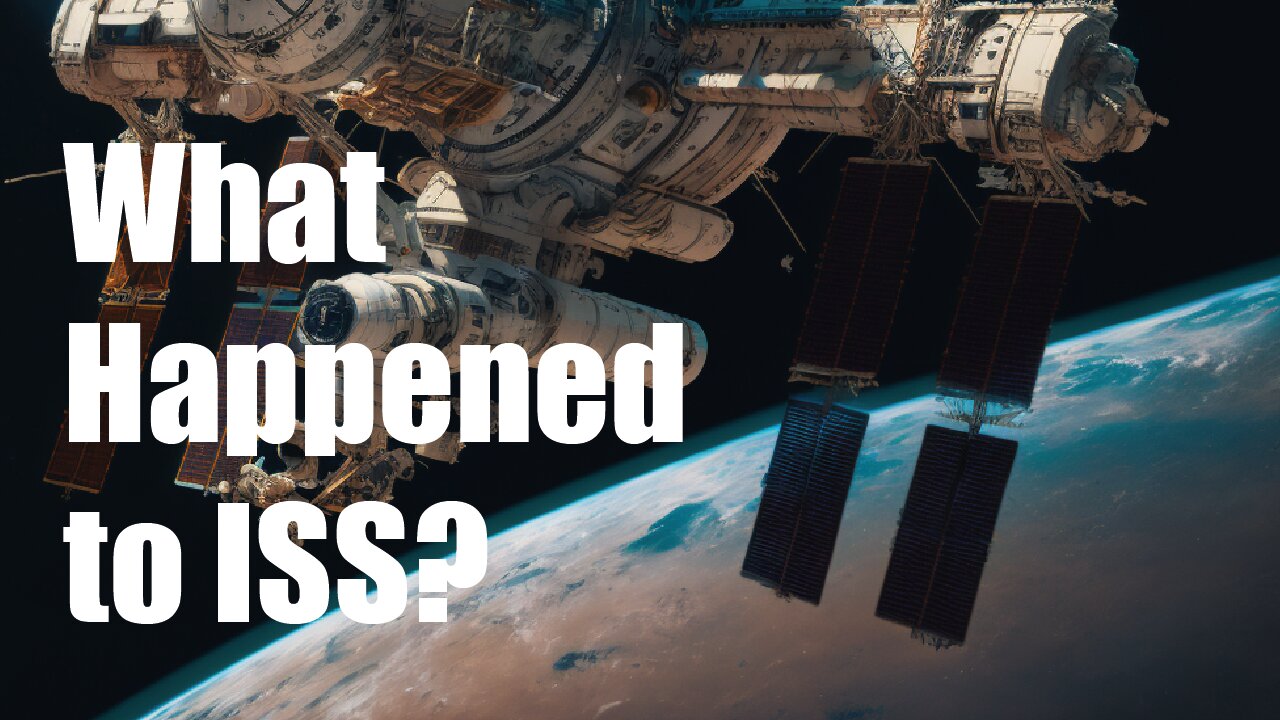Premium Only Content

What happened to the ISS?
The International Space Station (ISS) is a joint project among multiple space agencies and countries, including NASA (United States), Roscosmos (Russia), JAXA (Japan), ESA (Europe), and CSA (Canada). It is the largest and most complex space station ever built, and has been continuously occupied by crew members since 2000.
The ISS is a state-of-the-art research facility that enables scientists to conduct experiments in a variety of fields, including biology, Earth science, human research, material science, and more. It is also a platform for testing new technologies and conducting educational and outreach activities.
The ISS has a modular design and is made up of several pressurized modules that provide living and working spaces for the crew. It also has a number of solar panels that provide electricity, as well as a variety of external payloads and experiments that are mounted on its truss structure.
The ISS orbits Earth at an altitude of about 400 kilometers (250 miles), completing one orbit every 90 minutes. This means that the crew experiences 16 sunrises and sunsets every 24 hours, and they can see stunning views of Earth from the windows of the station.
Living and working on the ISS is a unique experience for crew members. They must adapt to living in a microgravity environment, which requires them to be physically and mentally fit. They also have to follow a strict schedule of work and leisure activities, and they must be able to work well as a team.
Another reason for the ISS is technology development. The ISS is a platform for testing new technologies and developing new capabilities for future space exploration. For example, researchers have used the ISS to test new propulsion systems, communications technologies, and life support systems. These technologies are not only important for future space missions, but they can also have practical applications on Earth, such as in the fields of transportation, healthcare, and environmental management.
The ISS is also a platform for educational and outreach activities. It serves as a unique opportunity for students and the public to engage with space exploration and learn about the scientific research being conducted on the station. This helps to inspire the next generation of scientists and explorers and promote public understanding of the importance of space research.
Finally, the ISS serves as a unique platform for international cooperation in space. It promotes peaceful cooperation and understanding among nations, and it is a testament to what can be achieved when nations work together towards a common goal.
Overall, the ISS is a vital component of the global space exploration program, and it continues to be an important platform for research, technology development, education, and international cooperation. Its contributions to science and technology have had a profound impact on our understanding of the universe, and it will continue to play a vital role in the future of space exploration.
The International Space Station (ISS) is currently in its second phase of operation, which is expected to last until at least 2030. During this phase, the ISS will continue to serve as a platform for scientific research, technology development, and international cooperation in space.
One of the main goals of the ISS during this phase is to continue conducting research that will benefit humanity and advance our understanding of the universe. This includes studying the effects of long-term exposure to microgravity on the human body, as well as examining the impacts of climate change and natural disasters on Earth's environment.
In addition to scientific research, the ISS will also continue to be a platform for technology development and testing. This includes developing new technologies for future space exploration, as well as testing new propulsion systems, communications technologies, and life support systems.
The ISS will also continue to serve as a platform for educational and outreach activities, including programs that engage students and the public in the excitement of space exploration.
Finally, the ISS will continue to be a symbol of international cooperation in space, promoting peaceful cooperation and understanding among nations.
Overall, the next phase of the ISS is expected to be an exciting time for space exploration, with many new discoveries and innovations on the horizon. The ISS will continue to be a vital component of the global space exploration program, and it will play a vital role in advancing our understanding of the universe and our place in it.
-
 LIVE
LIVE
Badlands Media
9 hours agoBaseless Conspiracies Ep. 156
6,307 watching -
 LIVE
LIVE
Inverted World Live
4 hours ago700 Scientists and Faith Leaders Warn About Super-Intelligent AI, "Time is Running Out" | Ep. 130
3,078 watching -
 2:50:47
2:50:47
TimcastIRL
3 hours agoFOOD STAMPS OVER, Ending Nov 1, Food RIOTS May Spark Trump INSURRECTION ACT | Timcast IRL
177K80 -
 2:18:46
2:18:46
Tucker Carlson
3 hours agoTucker Carlson Interviews Nick Fuentes
39.6K257 -
 LIVE
LIVE
Drew Hernandez
13 hours agoCANDACE OWENS CALLS CHARLIE KIRK STAFF INTO QUESTION?
1,219 watching -
 47:03
47:03
Barry Cunningham
6 hours agoPRESIDENT TRUMP MEETS WITH THE PRIME MINISTER OF JAPAN!! AND MORE NEWS!
22.4K21 -

Flyover Conservatives
22 hours agoThe Dollar Devaluation Playbook: Gold, Bitcoin… and the “Genius Act” - Andy Schectman | FOC Show
11.5K3 -
 LIVE
LIVE
SpartakusLIVE
5 hours agoWZ Tonight || Battlefield 6 BATTLE ROYALE Tomorrow!
286 watching -
 LIVE
LIVE
megimu32
3 hours agoON THE SUBJECT: Halloween Nostalgia! LET’S GET SPOOKY! 👻
66 watching -
 1:24:56
1:24:56
Glenn Greenwald
5 hours agoThe Unhinged Reactions to Zohran's Rise; Dems Struggle to Find a Personality; DHS, on Laura Loomer's Orders, Arrests UK Journalist and Israel Critic | SYSTEM UPDATE #538
105K58